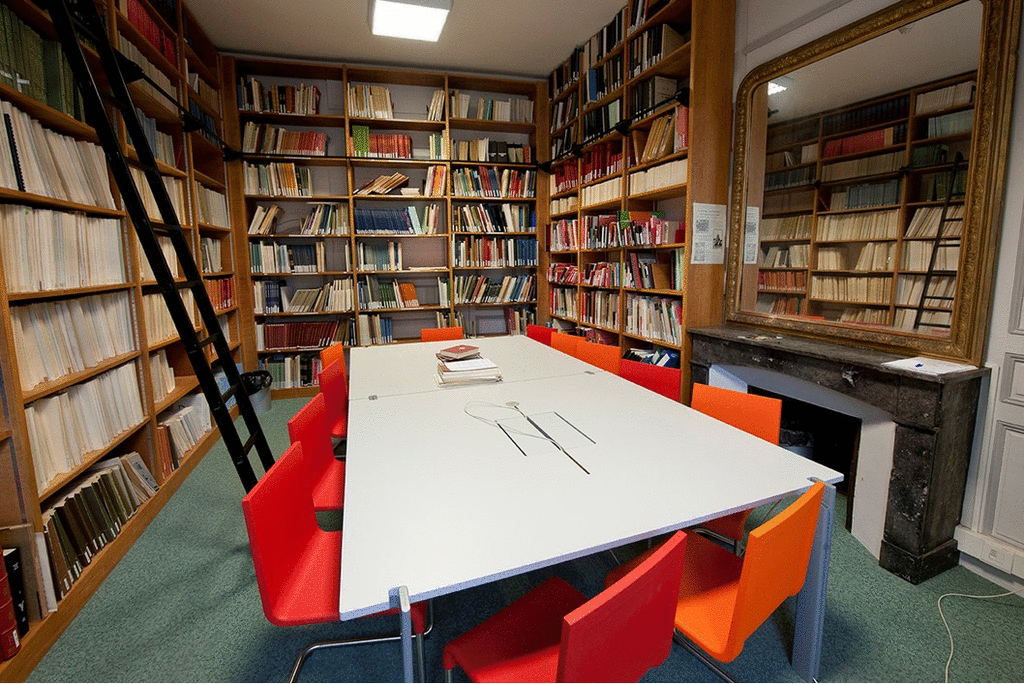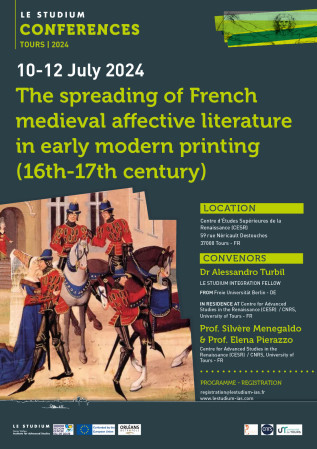The spreading of French medieval affective literature in early modern printing (16th-17th century)
Centre d’Études Supérieures de la Renaissance (CESR)
59 rue Néricault Destouches
37000 Tours
France
Presentation
The objective of the event is to examine the editorial techniques and cultural strategies utilized by the network of booksellers, printers, and bibliophiles who curated and disseminated medieval French affective literature to the general 'audience' in France and Europe since the introduction of the printing press in 1470. On the one hand, our focus is to examine the pre-modern and modern reception of this literature in a broad context. We will pay special attention to groups of texts such as courtly texts, specific forms of medieval lyricism, allegorical texts, and 'arts d'aimer'. On the other hand, we aim to investigate changes observed in the literary and cultural parameters that delimit the textual types which convey affection between the Middle Ages and Modernity. The contributions aim to demonstrate how the 'end' of the Middle Ages brought about changes in narrative, stylistic, and cultural models. A network of book professionals directed the reading and 'rereading' of these texts according to contemporary pre-modern and modern sensibilities. This will be measured by studying, on the one hand, the publishing policies and practices of booksellers and printers, in order to reconstruct the evolution of the tastes of the public to which these book were addressed (first in manuscript, then in print), and, on the other hand, the intellectual or cultural interests of patrons, bibliophiles and literati who 'rediscovered' the medieval past and treated them in their literary or historiographical works
CONVENORS
Confirmed speakers
- Sergio Cappello, University of Udine - Italy
- Cristina Cassia, University of Torino - Italy
- Violaine Chaudoreille, University of Rouen - France
- Luca Degl'Innocenti, University of Firenze - Italy
- Adeline Desbois-Ientile, University of Paris-Sorbonne - France
- Lucien Dugaz, University of Lausanne - Switzerland
- Fanny Maillet, University of Zurich - Switzerland
- Pascale Mounier, University Grenoble Alpes - France
- Sandra Provini, University of Rouen - France
- Stéphanie Rambaud, Bibliothèque Nationale de France - France
- Pauline Saccol, University Grenoble Alpes - France
- Alice Tacaille, Sorbonne Université-I - France
- Richard Trachsler, University of Zurich - Switzerland
- Marco Veneziale, University of Zurich - Switzerland
Programme
Mercredi 10 juillet 2024
- 15:30 Accueil des participants
- 15:45 Ouverture officielle – Alessandro Turbil, Silvère Menegaldo & Elena Pierazzo (CESR) & Sophie Gabillet (LE STUDIUM General Secretary)
- 16:15 Alessandro Turbil – Une matière affective française, une littérature affective en France ? Communautés émotionnelles, lecteurs d’artefacts culturels écrits, consommateurs d’impressions
Présidence: Pascale Mounier
- 16:30 Sergio Cappello – La réception de Floire et Blanchefleur en France au XVIe siècle
- 17:00 Pauline Saccol – Richard sans Peur et Brundemort : les états affectifs du chevalier face à l’esprit persécuteur
- 17:30 Discussion
- 17:50 Visite guidée du centre ville
- 19:15 Cocktail dînatoire vins & fromages
Jeudi 11 juillet 2024
- 9:45 Accueil
- Présidence: Stéphanie Rambaud
- 10:00 Lucien Dugaz – Fruit de la passion : cueillir l’amour dans Le Vergier d’honneur
- 10:30 Marco Veneziale – Affectés par la prison. Charles d’Orléans et François Ier entre manuscrit et imprimé
- 11:00 Discussion et pause
- 11:30 Adeline Desbois-Ientile – Reconfigurations poétiques : autour du Triumphe de l’amant vert (1535)
- 12:00 Alice Tacaille – Images courtoises dans les vers à chanter de la première Renaissance (1512-1530) à Paris : du chevalier au soudard, les nouvelles tribulations de l’amour, des regrets et du deuil
- 12:30 Discussion
- 13:00 Déjeuner
- Présidence: Adeline Desbois-Ientile
- 14:30 Sandra Provini – Les XXI Epistres d’Ovide d’Octovien de Saint-Gelais (1497) : du manuscrit à l’imprimé, la fabrique d’un succès éditorial durable
- 15:00 Pascale Mounier – Une « loyalle amye » en héroïne ovidienne : l’amour féminin dans l’Epistre de maguelonne de Marot
- 15:30 Discussion et pause
- 16:00 Violaine Chaudoreille – La publication des traductions médiévales du corpus érotique d’Ovide au XVIe siècle, entre succès d’édition et contournements de censure
- 16:30 Fanny Maillet – La formation du recueil de Ovide arte amandi, des incunables à l’édition de Thomas Mallard (1581)
- 17:00 Discussion
- 19:30 Dîner
Vendredi 12 juillet 2024
- 10:00 Accueil
- Présidence: Sergio Cappello
- 10:30 Stéphanie Rambaud - Les pages de titre des romans idylliques et autres textes affectifs, des Trepperel à Denis Janot (Paris, 1500-1540) : associer l’image et les caractères gothiques
- 11:00 Luca Degl’Innocenti – Mourning for Roland’s death : notes on the art of arousing emotions in Italian Renaissance chivalric performances and texts
- 11:30 Cristina Cassia – Amadis de Gaule en musique : l’Amadis de Jean-Baptiste Lully (1684) et le roman de chevalerie à la cour de Louis XIV
- 12:00 Discussion et conclusion des travaux
- 12:30 Déjeuner
Location
The conference venue is unique. Located right next to the basilica of St Martin in the old city centre of Tours, the Centre d'Études Supérieures de la Renaissance (Centre for Advanced Studies in the Renaissance) is a teaching and research institution which welcomes students and researchers seeking initial or supplementary instruction in all aspects of the Renaissance. The Centre was initially constituted in 1956 on the basis of a library and a documentary archive, supplemented by a collection of photographs and databases. It is now a venue for multi-disciplinary instruction, which, in association with the various Faculties of the University, has responsibility for teaching and research in History, History of Art, Literature, Languages, Musicology, and Philosophy. It currently leads a large research programme dedicated to the cultural regional heritage (Intelligence des Patrimoines). As a research centre it brings together fifty or so researchers committed to the investigation of the "civilization of the Renaissance" from Petrarch to Descartes. Participants will be welcomed in this exceptional surrounding blending Middle Age and Renaissance cultures and will have the opportunity to discover French cuisine and wines.
General Information
| Congress Venue |
Centre d’Études Supérieures de la Renaissance (CESR)
59 rue Néricault Destouches - 37000 Tours, France
| Dates |
Wednesday, 10 July to Friday 12 July 2024
| Language |
The official language of the Congress is English and French
| Welcome pack and Name Badge |
Upon arrival you will receive a welcome pack that includes the printed material of the Conference and your name badge will be given to you at the reception . Please wear your name badge at all times during the Conference and to all official Conference events.
| Invitation Letters |
An official letter of invitation facilitating the obtention of an entry visa can be sent upon request . In order to receive an invitation letter for visa purposes, send an email to maurine.villiers@lestudium-ias.fr. Please note that :
- we only issue an official letter once the payment of the registration fee has been validated.
- such letters do not represent a commitment on the part of the Organisers to provide any financial assistance.
| Certificate of attendance |
After the conference, in order to receive a certficate of participation, send an email to maurine.villiers@lestudium-ias.fr
![]()
By train:
* Tours centre station
1.5 hour trip from Paris (Montparnasse)
* Saint Pierre des Corps (4km from Tours town centre)
Bus 5, 20 minutes trip to Tours centre station
> Plan your trip by train: https://www.sncf-connect.com/en-en/
![]()
By car:
GPS: 47.3918282,0.6823076
Please note that you can't park in the courtyard in front of the CESR.
Paid car parks nearby :
Parking Indigo Tours Halles Vieux Tours, 36 Place Gaston Paillhou, 37000 Tours
Parking Gambetta, 8 Rue Gambetta, 37000 Tours
Parking Indigo Tours Nationale, 5 Rue Emile Zola, 37000 Tours
![]()
By plane:
*Arrival at Roissy Charles De Gaulle (CDG) airport:
Take RER B in direction to Saint Rémy Les Chevreuse, step out at Denfert Rochereau Stop
Metro 6 in direction to Charles de Gaulle Etoile, step out at Montparnasse Bienvenue Stop
> Then take a train to Tours (see "by train" section above)
*Arrival at Paris-Orly (ORY) airport:
Take Orlyval Shuttle from Aéroport d’Orly in direction Antony, step out at Antony Stop
Take RER B in direction to Mitry Clave, step out at Denfert Rochereau Stop
Take Metro 6 in direction to Charles de Gaulle Etoile, step out at Montparnasse Bienvenue Stop
> Then take a train to Tours (see "by train" section above)








